Leadership Development Plan: MGT601, University Report
VerifiedAdded on 2023/05/28
|20
|4265
|243
Report
AI Summary
This report, focusing on leadership development, begins with an executive summary that identifies the roles of leaders in enhancing organizational performance and outlines a personal leadership skill development plan. It explores leadership theories and approaches, including functional, behavioral, transactional, transformational, and charismatic leadership, emphasizing the importance of adaptability, communication, and vision. The report then delves into the needs for personal development, highlighting gaps in communication, adaptability, and empathy, and how these affect leadership effectiveness. Finally, it proposes a personal development plan, utilizing the Boyatzis Intentional Change model to address identified weaknesses and improve leadership capabilities. The report emphasizes the importance of continuous learning and self-development for effective leadership.
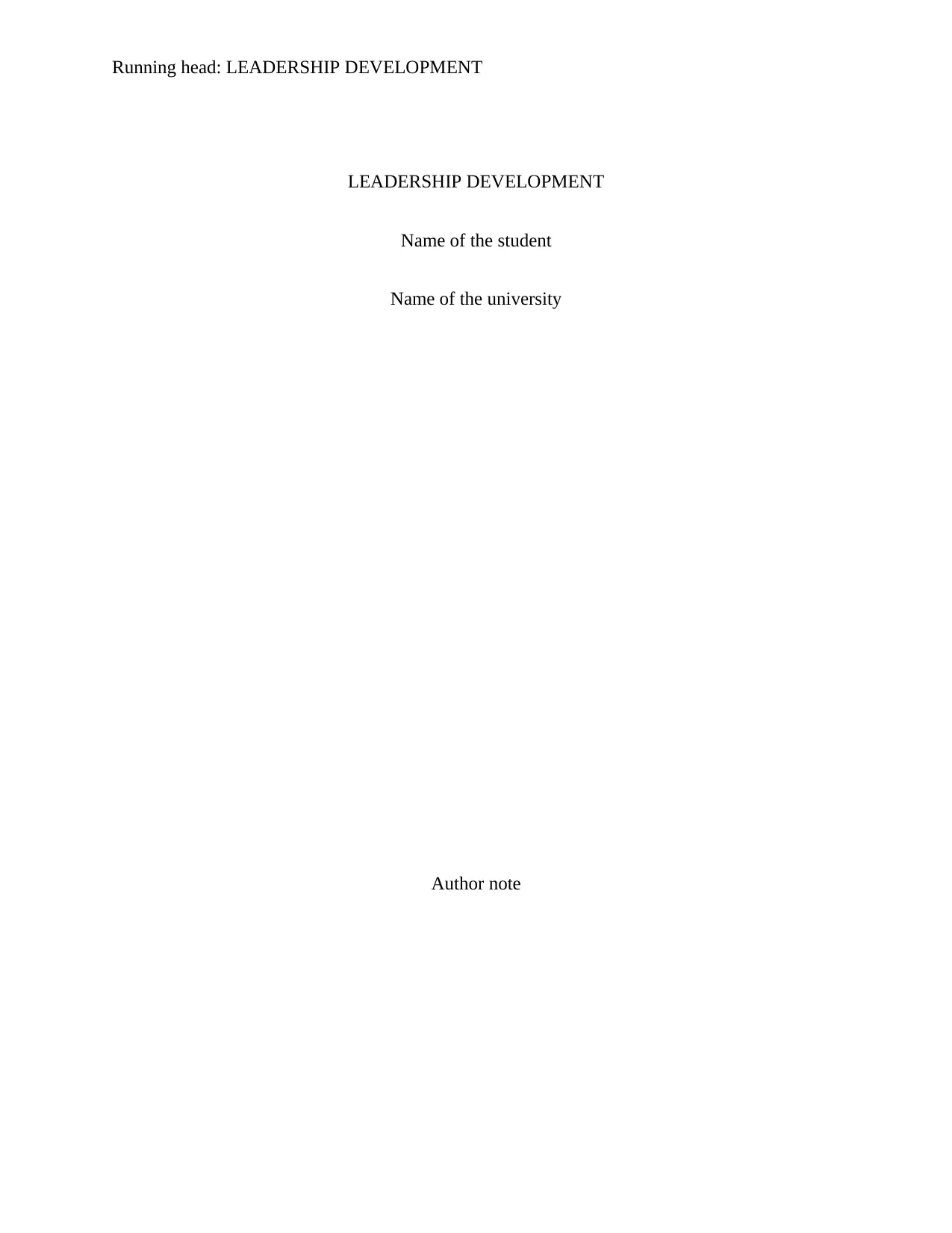
Running head: LEADERSHIP DEVELOPMENT
LEADERSHIP DEVELOPMENT
Name of the student
Name of the university
Author note
LEADERSHIP DEVELOPMENT
Name of the student
Name of the university
Author note
Paraphrase This Document
Need a fresh take? Get an instant paraphrase of this document with our AI Paraphraser
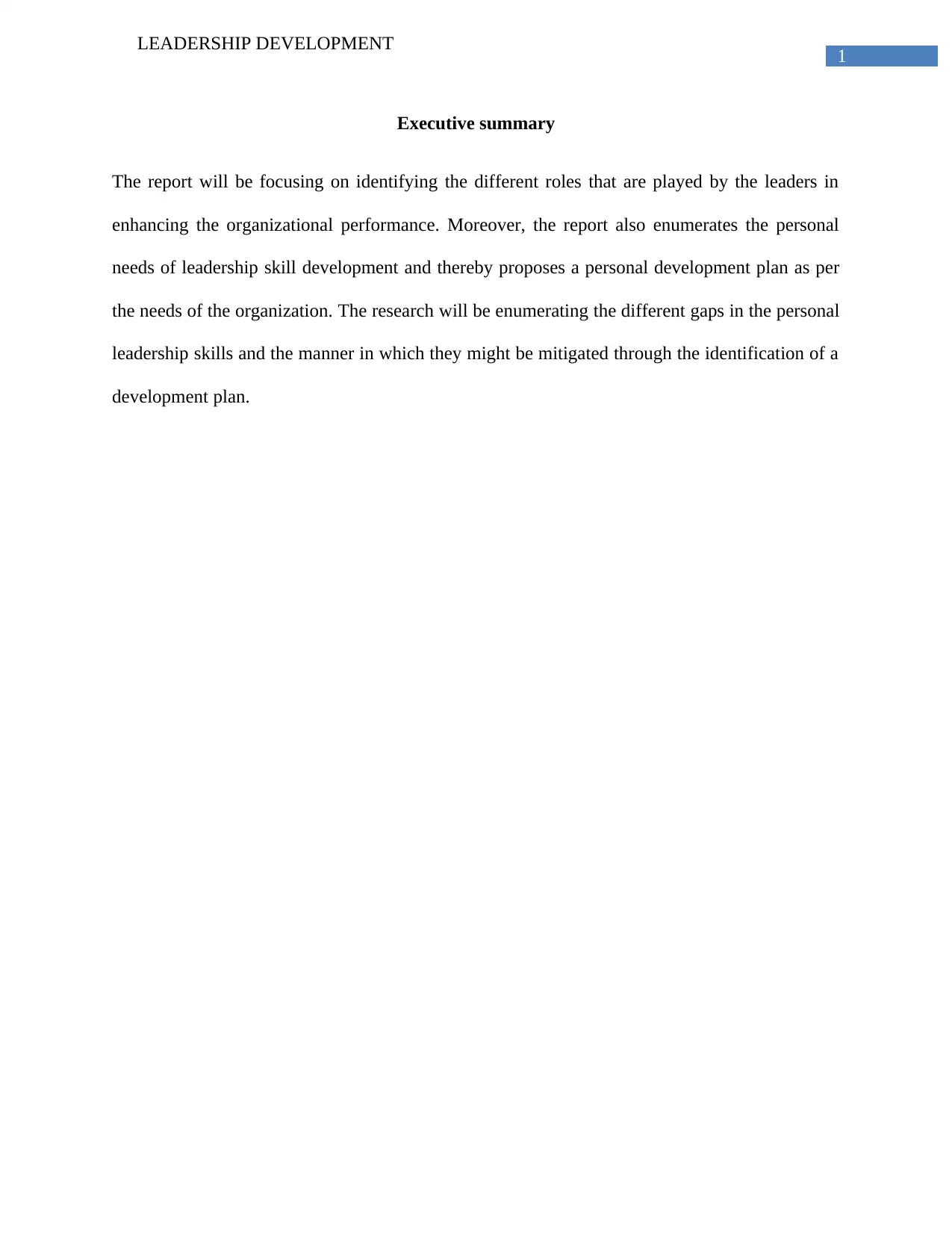
1
LEADERSHIP DEVELOPMENT
Executive summary
The report will be focusing on identifying the different roles that are played by the leaders in
enhancing the organizational performance. Moreover, the report also enumerates the personal
needs of leadership skill development and thereby proposes a personal development plan as per
the needs of the organization. The research will be enumerating the different gaps in the personal
leadership skills and the manner in which they might be mitigated through the identification of a
development plan.
LEADERSHIP DEVELOPMENT
Executive summary
The report will be focusing on identifying the different roles that are played by the leaders in
enhancing the organizational performance. Moreover, the report also enumerates the personal
needs of leadership skill development and thereby proposes a personal development plan as per
the needs of the organization. The research will be enumerating the different gaps in the personal
leadership skills and the manner in which they might be mitigated through the identification of a
development plan.
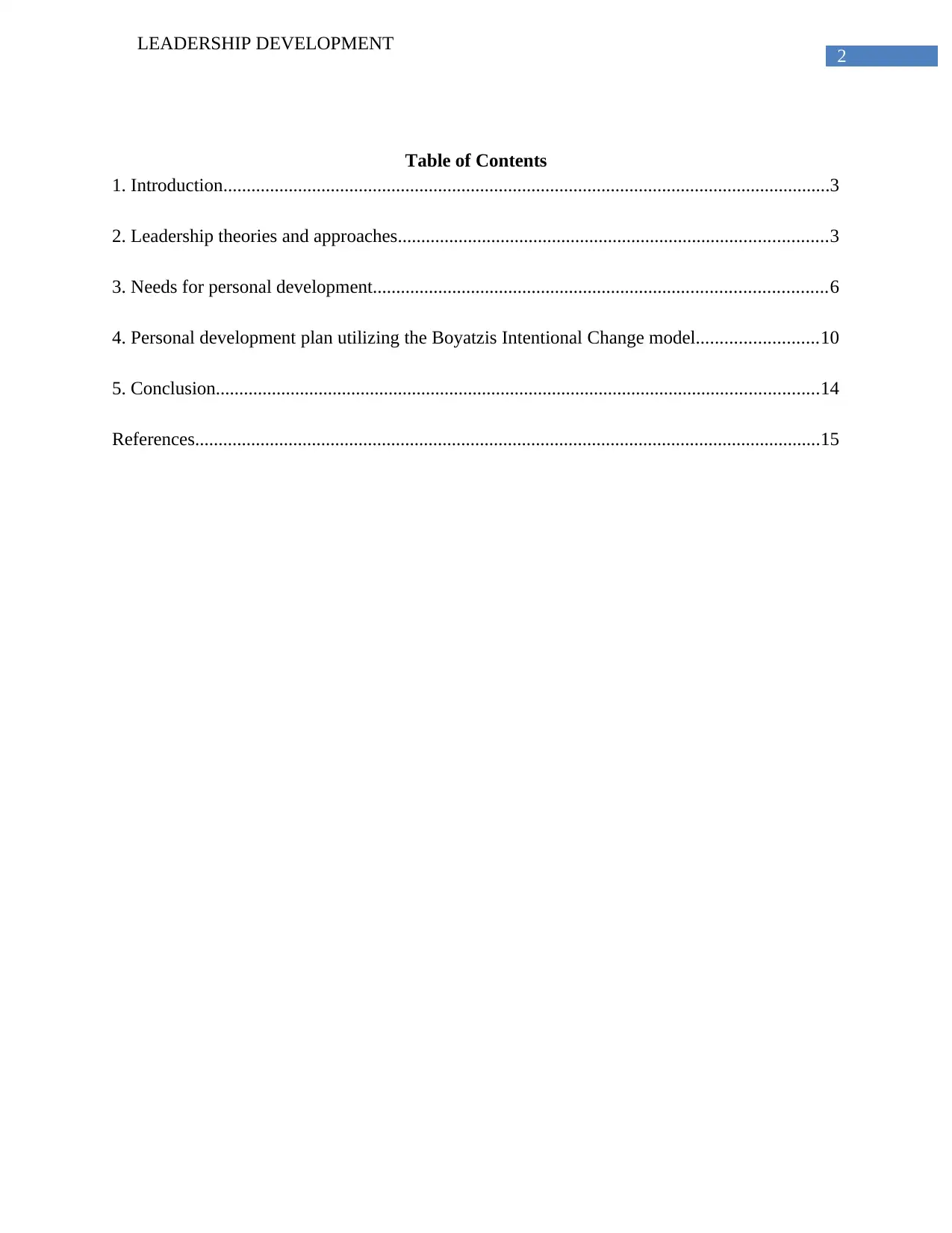
2
LEADERSHIP DEVELOPMENT
Table of Contents
1. Introduction..................................................................................................................................3
2. Leadership theories and approaches............................................................................................3
3. Needs for personal development.................................................................................................6
4. Personal development plan utilizing the Boyatzis Intentional Change model..........................10
5. Conclusion.................................................................................................................................14
References......................................................................................................................................15
LEADERSHIP DEVELOPMENT
Table of Contents
1. Introduction..................................................................................................................................3
2. Leadership theories and approaches............................................................................................3
3. Needs for personal development.................................................................................................6
4. Personal development plan utilizing the Boyatzis Intentional Change model..........................10
5. Conclusion.................................................................................................................................14
References......................................................................................................................................15
⊘ This is a preview!⊘
Do you want full access?
Subscribe today to unlock all pages.

Trusted by 1+ million students worldwide
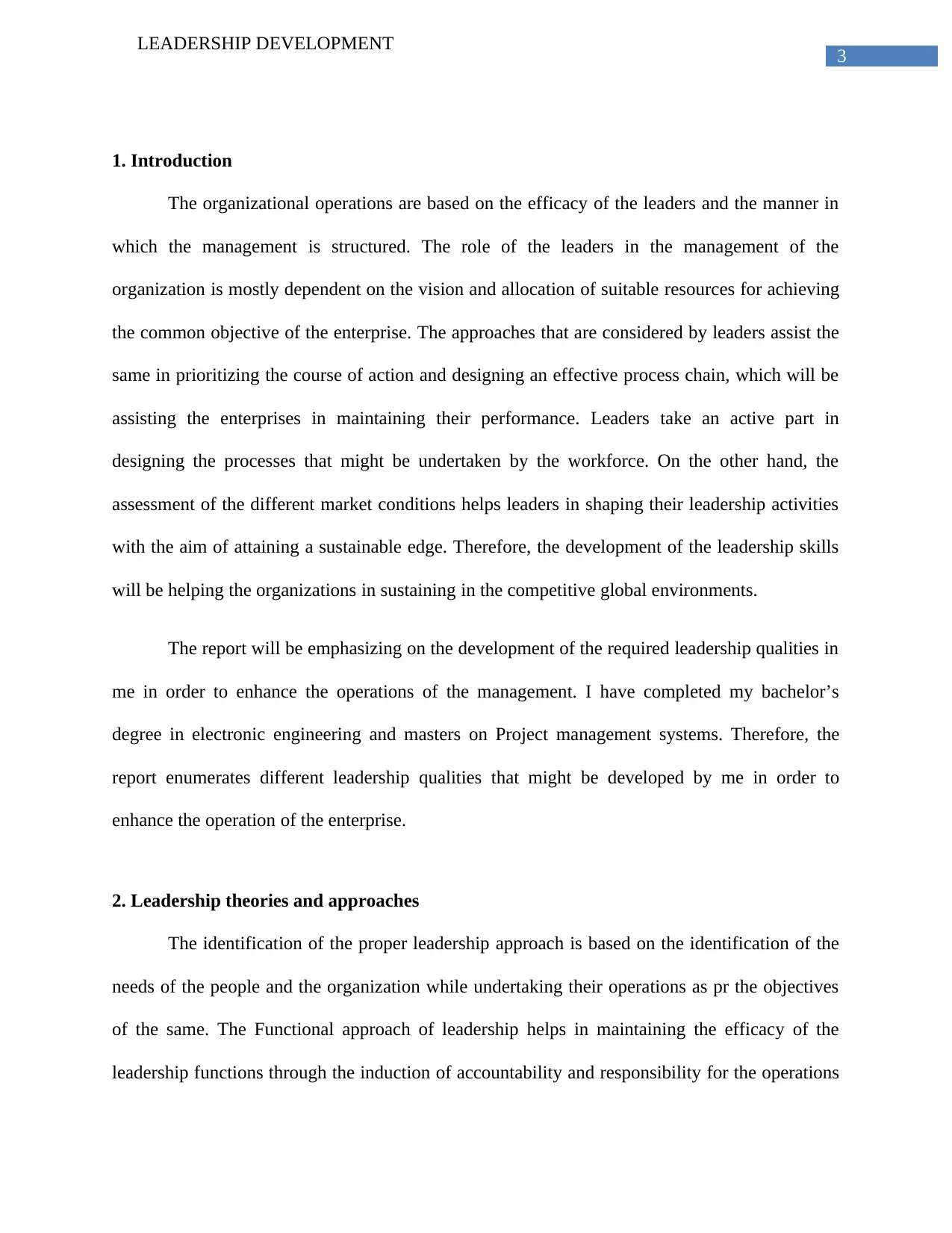
3
LEADERSHIP DEVELOPMENT
1. Introduction
The organizational operations are based on the efficacy of the leaders and the manner in
which the management is structured. The role of the leaders in the management of the
organization is mostly dependent on the vision and allocation of suitable resources for achieving
the common objective of the enterprise. The approaches that are considered by leaders assist the
same in prioritizing the course of action and designing an effective process chain, which will be
assisting the enterprises in maintaining their performance. Leaders take an active part in
designing the processes that might be undertaken by the workforce. On the other hand, the
assessment of the different market conditions helps leaders in shaping their leadership activities
with the aim of attaining a sustainable edge. Therefore, the development of the leadership skills
will be helping the organizations in sustaining in the competitive global environments.
The report will be emphasizing on the development of the required leadership qualities in
me in order to enhance the operations of the management. I have completed my bachelor’s
degree in electronic engineering and masters on Project management systems. Therefore, the
report enumerates different leadership qualities that might be developed by me in order to
enhance the operation of the enterprise.
2. Leadership theories and approaches
The identification of the proper leadership approach is based on the identification of the
needs of the people and the organization while undertaking their operations as pr the objectives
of the same. The Functional approach of leadership helps in maintaining the efficacy of the
leadership functions through the induction of accountability and responsibility for the operations
LEADERSHIP DEVELOPMENT
1. Introduction
The organizational operations are based on the efficacy of the leaders and the manner in
which the management is structured. The role of the leaders in the management of the
organization is mostly dependent on the vision and allocation of suitable resources for achieving
the common objective of the enterprise. The approaches that are considered by leaders assist the
same in prioritizing the course of action and designing an effective process chain, which will be
assisting the enterprises in maintaining their performance. Leaders take an active part in
designing the processes that might be undertaken by the workforce. On the other hand, the
assessment of the different market conditions helps leaders in shaping their leadership activities
with the aim of attaining a sustainable edge. Therefore, the development of the leadership skills
will be helping the organizations in sustaining in the competitive global environments.
The report will be emphasizing on the development of the required leadership qualities in
me in order to enhance the operations of the management. I have completed my bachelor’s
degree in electronic engineering and masters on Project management systems. Therefore, the
report enumerates different leadership qualities that might be developed by me in order to
enhance the operation of the enterprise.
2. Leadership theories and approaches
The identification of the proper leadership approach is based on the identification of the
needs of the people and the organization while undertaking their operations as pr the objectives
of the same. The Functional approach of leadership helps in maintaining the efficacy of the
leadership functions through the induction of accountability and responsibility for the operations
Paraphrase This Document
Need a fresh take? Get an instant paraphrase of this document with our AI Paraphraser
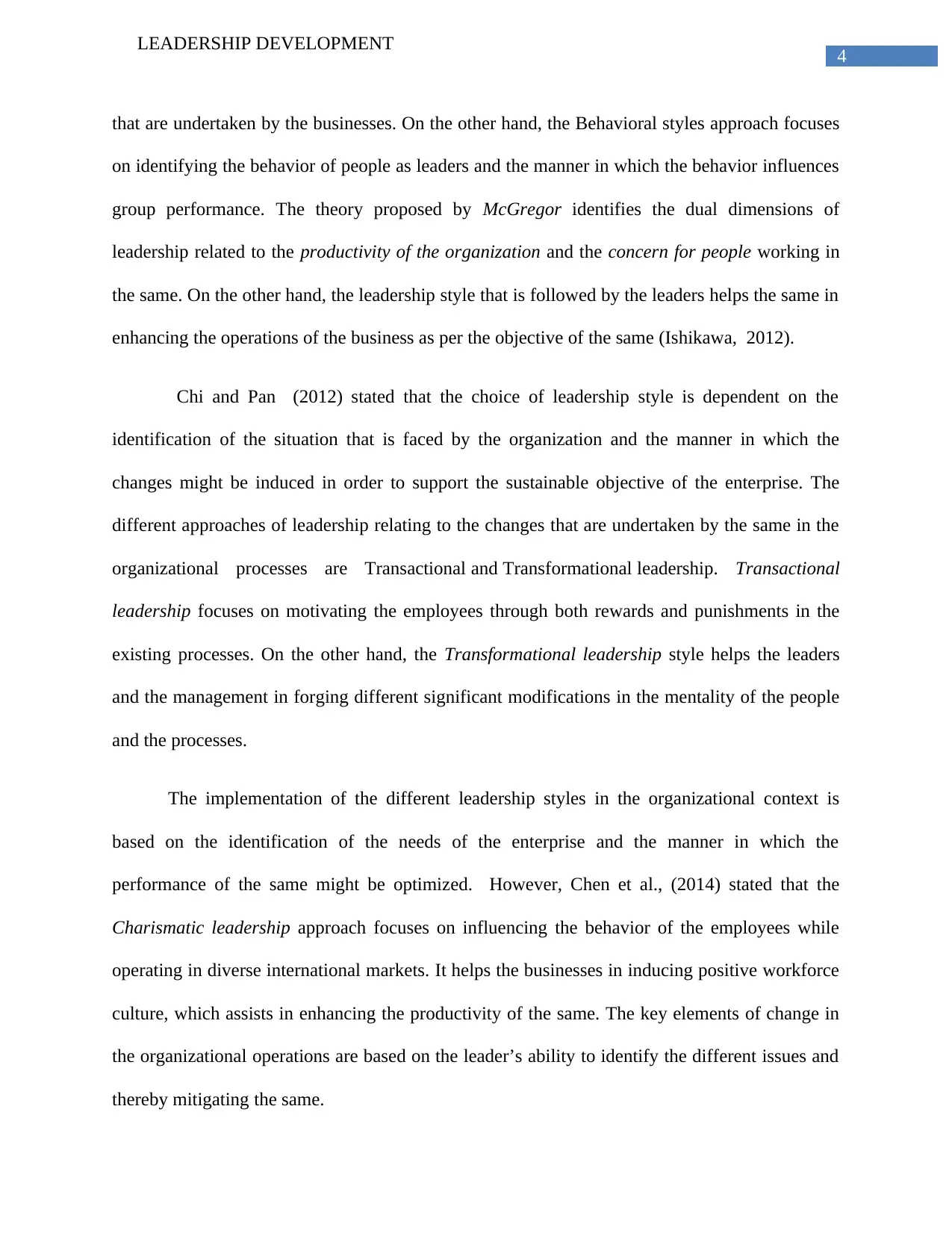
4
LEADERSHIP DEVELOPMENT
that are undertaken by the businesses. On the other hand, the Behavioral styles approach focuses
on identifying the behavior of people as leaders and the manner in which the behavior influences
group performance. The theory proposed by McGregor identifies the dual dimensions of
leadership related to the productivity of the organization and the concern for people working in
the same. On the other hand, the leadership style that is followed by the leaders helps the same in
enhancing the operations of the business as per the objective of the same (Ishikawa, 2012).
Chi and Pan (2012) stated that the choice of leadership style is dependent on the
identification of the situation that is faced by the organization and the manner in which the
changes might be induced in order to support the sustainable objective of the enterprise. The
different approaches of leadership relating to the changes that are undertaken by the same in the
organizational processes are Transactional and Transformational leadership. Transactional
leadership focuses on motivating the employees through both rewards and punishments in the
existing processes. On the other hand, the Transformational leadership style helps the leaders
and the management in forging different significant modifications in the mentality of the people
and the processes.
The implementation of the different leadership styles in the organizational context is
based on the identification of the needs of the enterprise and the manner in which the
performance of the same might be optimized. However, Chen et al., (2014) stated that the
Charismatic leadership approach focuses on influencing the behavior of the employees while
operating in diverse international markets. It helps the businesses in inducing positive workforce
culture, which assists in enhancing the productivity of the same. The key elements of change in
the organizational operations are based on the leader’s ability to identify the different issues and
thereby mitigating the same.
LEADERSHIP DEVELOPMENT
that are undertaken by the businesses. On the other hand, the Behavioral styles approach focuses
on identifying the behavior of people as leaders and the manner in which the behavior influences
group performance. The theory proposed by McGregor identifies the dual dimensions of
leadership related to the productivity of the organization and the concern for people working in
the same. On the other hand, the leadership style that is followed by the leaders helps the same in
enhancing the operations of the business as per the objective of the same (Ishikawa, 2012).
Chi and Pan (2012) stated that the choice of leadership style is dependent on the
identification of the situation that is faced by the organization and the manner in which the
changes might be induced in order to support the sustainable objective of the enterprise. The
different approaches of leadership relating to the changes that are undertaken by the same in the
organizational processes are Transactional and Transformational leadership. Transactional
leadership focuses on motivating the employees through both rewards and punishments in the
existing processes. On the other hand, the Transformational leadership style helps the leaders
and the management in forging different significant modifications in the mentality of the people
and the processes.
The implementation of the different leadership styles in the organizational context is
based on the identification of the needs of the enterprise and the manner in which the
performance of the same might be optimized. However, Chen et al., (2014) stated that the
Charismatic leadership approach focuses on influencing the behavior of the employees while
operating in diverse international markets. It helps the businesses in inducing positive workforce
culture, which assists in enhancing the productivity of the same. The key elements of change in
the organizational operations are based on the leader’s ability to identify the different issues and
thereby mitigating the same.
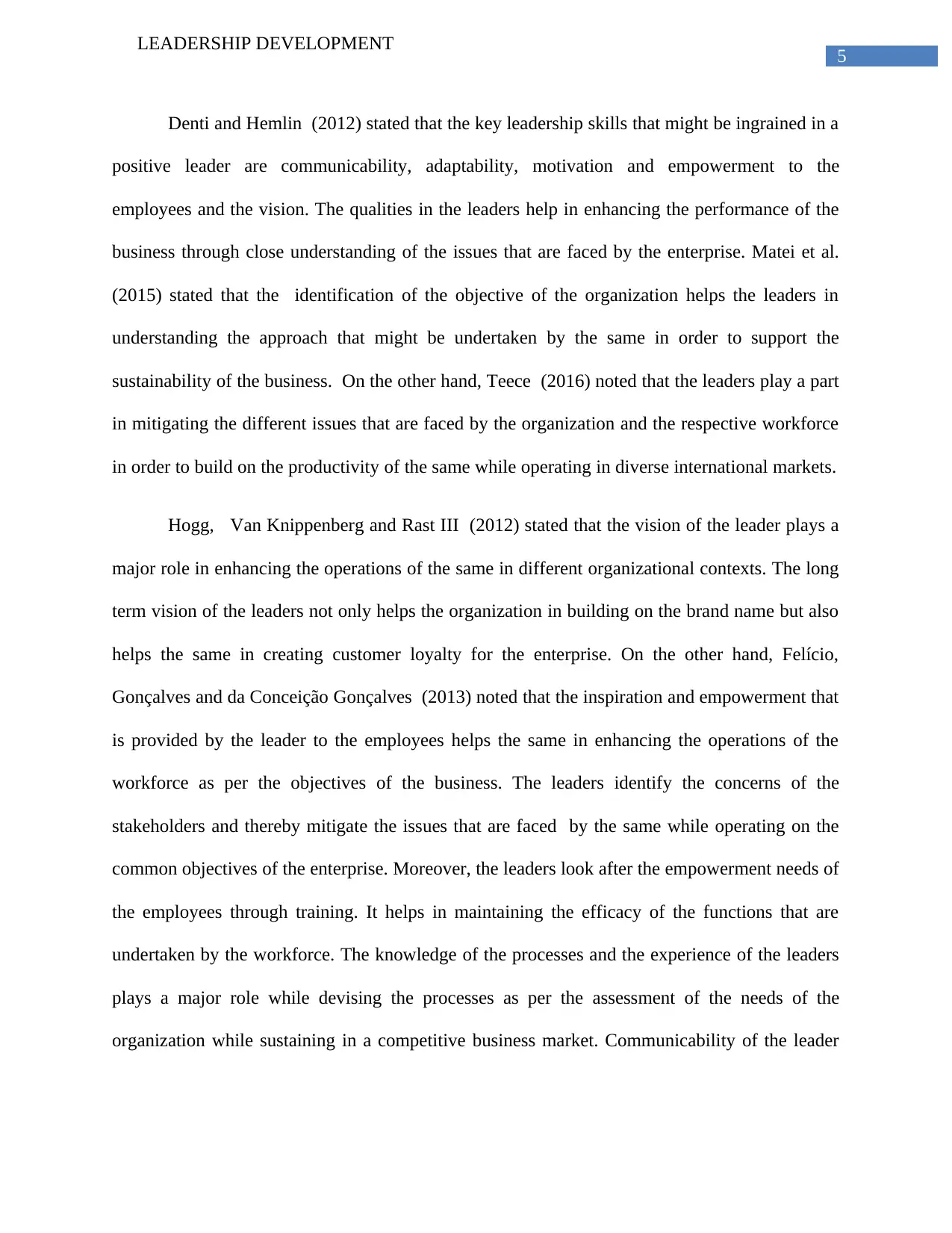
5
LEADERSHIP DEVELOPMENT
Denti and Hemlin (2012) stated that the key leadership skills that might be ingrained in a
positive leader are communicability, adaptability, motivation and empowerment to the
employees and the vision. The qualities in the leaders help in enhancing the performance of the
business through close understanding of the issues that are faced by the enterprise. Matei et al.
(2015) stated that the identification of the objective of the organization helps the leaders in
understanding the approach that might be undertaken by the same in order to support the
sustainability of the business. On the other hand, Teece (2016) noted that the leaders play a part
in mitigating the different issues that are faced by the organization and the respective workforce
in order to build on the productivity of the same while operating in diverse international markets.
Hogg, Van Knippenberg and Rast III (2012) stated that the vision of the leader plays a
major role in enhancing the operations of the same in different organizational contexts. The long
term vision of the leaders not only helps the organization in building on the brand name but also
helps the same in creating customer loyalty for the enterprise. On the other hand, Felício,
Gonçalves and da Conceição Gonçalves (2013) noted that the inspiration and empowerment that
is provided by the leader to the employees helps the same in enhancing the operations of the
workforce as per the objectives of the business. The leaders identify the concerns of the
stakeholders and thereby mitigate the issues that are faced by the same while operating on the
common objectives of the enterprise. Moreover, the leaders look after the empowerment needs of
the employees through training. It helps in maintaining the efficacy of the functions that are
undertaken by the workforce. The knowledge of the processes and the experience of the leaders
plays a major role while devising the processes as per the assessment of the needs of the
organization while sustaining in a competitive business market. Communicability of the leader
LEADERSHIP DEVELOPMENT
Denti and Hemlin (2012) stated that the key leadership skills that might be ingrained in a
positive leader are communicability, adaptability, motivation and empowerment to the
employees and the vision. The qualities in the leaders help in enhancing the performance of the
business through close understanding of the issues that are faced by the enterprise. Matei et al.
(2015) stated that the identification of the objective of the organization helps the leaders in
understanding the approach that might be undertaken by the same in order to support the
sustainability of the business. On the other hand, Teece (2016) noted that the leaders play a part
in mitigating the different issues that are faced by the organization and the respective workforce
in order to build on the productivity of the same while operating in diverse international markets.
Hogg, Van Knippenberg and Rast III (2012) stated that the vision of the leader plays a
major role in enhancing the operations of the same in different organizational contexts. The long
term vision of the leaders not only helps the organization in building on the brand name but also
helps the same in creating customer loyalty for the enterprise. On the other hand, Felício,
Gonçalves and da Conceição Gonçalves (2013) noted that the inspiration and empowerment that
is provided by the leader to the employees helps the same in enhancing the operations of the
workforce as per the objectives of the business. The leaders identify the concerns of the
stakeholders and thereby mitigate the issues that are faced by the same while operating on the
common objectives of the enterprise. Moreover, the leaders look after the empowerment needs of
the employees through training. It helps in maintaining the efficacy of the functions that are
undertaken by the workforce. The knowledge of the processes and the experience of the leaders
plays a major role while devising the processes as per the assessment of the needs of the
organization while sustaining in a competitive business market. Communicability of the leader
⊘ This is a preview!⊘
Do you want full access?
Subscribe today to unlock all pages.

Trusted by 1+ million students worldwide
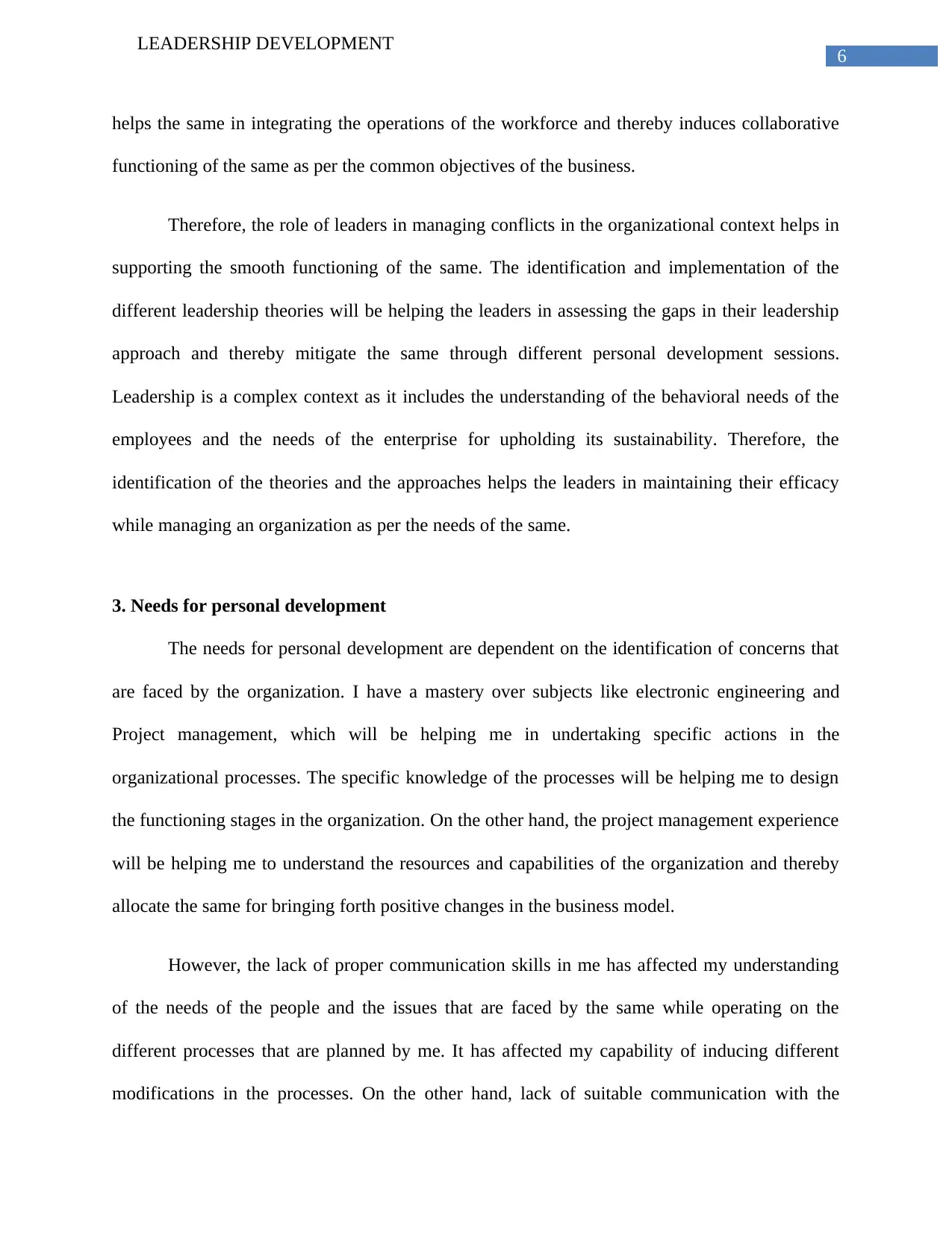
6
LEADERSHIP DEVELOPMENT
helps the same in integrating the operations of the workforce and thereby induces collaborative
functioning of the same as per the common objectives of the business.
Therefore, the role of leaders in managing conflicts in the organizational context helps in
supporting the smooth functioning of the same. The identification and implementation of the
different leadership theories will be helping the leaders in assessing the gaps in their leadership
approach and thereby mitigate the same through different personal development sessions.
Leadership is a complex context as it includes the understanding of the behavioral needs of the
employees and the needs of the enterprise for upholding its sustainability. Therefore, the
identification of the theories and the approaches helps the leaders in maintaining their efficacy
while managing an organization as per the needs of the same.
3. Needs for personal development
The needs for personal development are dependent on the identification of concerns that
are faced by the organization. I have a mastery over subjects like electronic engineering and
Project management, which will be helping me in undertaking specific actions in the
organizational processes. The specific knowledge of the processes will be helping me to design
the functioning stages in the organization. On the other hand, the project management experience
will be helping me to understand the resources and capabilities of the organization and thereby
allocate the same for bringing forth positive changes in the business model.
However, the lack of proper communication skills in me has affected my understanding
of the needs of the people and the issues that are faced by the same while operating on the
different processes that are planned by me. It has affected my capability of inducing different
modifications in the processes. On the other hand, lack of suitable communication with the
LEADERSHIP DEVELOPMENT
helps the same in integrating the operations of the workforce and thereby induces collaborative
functioning of the same as per the common objectives of the business.
Therefore, the role of leaders in managing conflicts in the organizational context helps in
supporting the smooth functioning of the same. The identification and implementation of the
different leadership theories will be helping the leaders in assessing the gaps in their leadership
approach and thereby mitigate the same through different personal development sessions.
Leadership is a complex context as it includes the understanding of the behavioral needs of the
employees and the needs of the enterprise for upholding its sustainability. Therefore, the
identification of the theories and the approaches helps the leaders in maintaining their efficacy
while managing an organization as per the needs of the same.
3. Needs for personal development
The needs for personal development are dependent on the identification of concerns that
are faced by the organization. I have a mastery over subjects like electronic engineering and
Project management, which will be helping me in undertaking specific actions in the
organizational processes. The specific knowledge of the processes will be helping me to design
the functioning stages in the organization. On the other hand, the project management experience
will be helping me to understand the resources and capabilities of the organization and thereby
allocate the same for bringing forth positive changes in the business model.
However, the lack of proper communication skills in me has affected my understanding
of the needs of the people and the issues that are faced by the same while operating on the
different processes that are planned by me. It has affected my capability of inducing different
modifications in the processes. On the other hand, lack of suitable communication with the
Paraphrase This Document
Need a fresh take? Get an instant paraphrase of this document with our AI Paraphraser
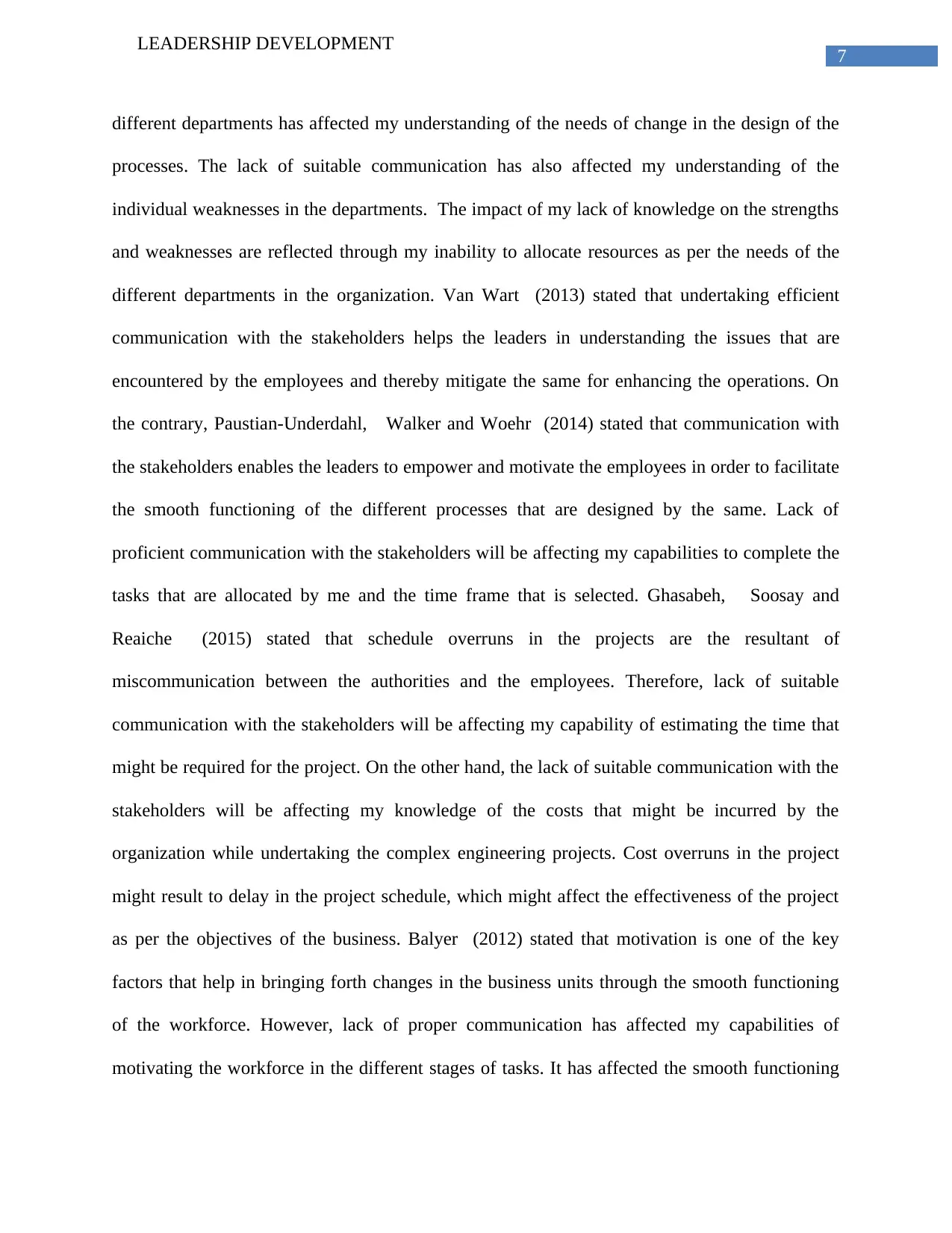
7
LEADERSHIP DEVELOPMENT
different departments has affected my understanding of the needs of change in the design of the
processes. The lack of suitable communication has also affected my understanding of the
individual weaknesses in the departments. The impact of my lack of knowledge on the strengths
and weaknesses are reflected through my inability to allocate resources as per the needs of the
different departments in the organization. Van Wart (2013) stated that undertaking efficient
communication with the stakeholders helps the leaders in understanding the issues that are
encountered by the employees and thereby mitigate the same for enhancing the operations. On
the contrary, Paustian-Underdahl, Walker and Woehr (2014) stated that communication with
the stakeholders enables the leaders to empower and motivate the employees in order to facilitate
the smooth functioning of the different processes that are designed by the same. Lack of
proficient communication with the stakeholders will be affecting my capabilities to complete the
tasks that are allocated by me and the time frame that is selected. Ghasabeh, Soosay and
Reaiche (2015) stated that schedule overruns in the projects are the resultant of
miscommunication between the authorities and the employees. Therefore, lack of suitable
communication with the stakeholders will be affecting my capability of estimating the time that
might be required for the project. On the other hand, the lack of suitable communication with the
stakeholders will be affecting my knowledge of the costs that might be incurred by the
organization while undertaking the complex engineering projects. Cost overruns in the project
might result to delay in the project schedule, which might affect the effectiveness of the project
as per the objectives of the business. Balyer (2012) stated that motivation is one of the key
factors that help in bringing forth changes in the business units through the smooth functioning
of the workforce. However, lack of proper communication has affected my capabilities of
motivating the workforce in the different stages of tasks. It has affected the smooth functioning
LEADERSHIP DEVELOPMENT
different departments has affected my understanding of the needs of change in the design of the
processes. The lack of suitable communication has also affected my understanding of the
individual weaknesses in the departments. The impact of my lack of knowledge on the strengths
and weaknesses are reflected through my inability to allocate resources as per the needs of the
different departments in the organization. Van Wart (2013) stated that undertaking efficient
communication with the stakeholders helps the leaders in understanding the issues that are
encountered by the employees and thereby mitigate the same for enhancing the operations. On
the contrary, Paustian-Underdahl, Walker and Woehr (2014) stated that communication with
the stakeholders enables the leaders to empower and motivate the employees in order to facilitate
the smooth functioning of the different processes that are designed by the same. Lack of
proficient communication with the stakeholders will be affecting my capabilities to complete the
tasks that are allocated by me and the time frame that is selected. Ghasabeh, Soosay and
Reaiche (2015) stated that schedule overruns in the projects are the resultant of
miscommunication between the authorities and the employees. Therefore, lack of suitable
communication with the stakeholders will be affecting my capability of estimating the time that
might be required for the project. On the other hand, the lack of suitable communication with the
stakeholders will be affecting my knowledge of the costs that might be incurred by the
organization while undertaking the complex engineering projects. Cost overruns in the project
might result to delay in the project schedule, which might affect the effectiveness of the project
as per the objectives of the business. Balyer (2012) stated that motivation is one of the key
factors that help in bringing forth changes in the business units through the smooth functioning
of the workforce. However, lack of proper communication has affected my capabilities of
motivating the workforce in the different stages of tasks. It has affected the smooth functioning
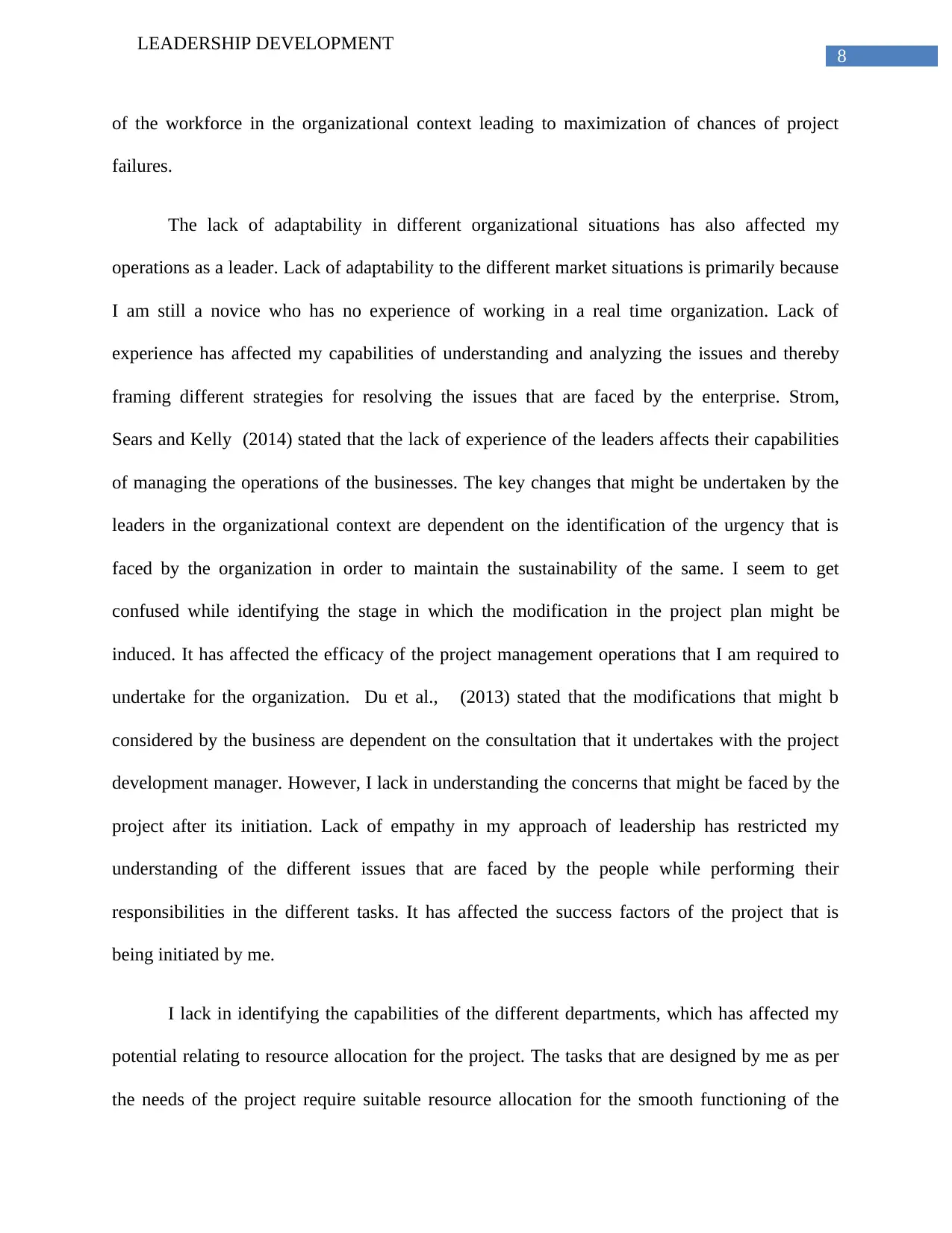
8
LEADERSHIP DEVELOPMENT
of the workforce in the organizational context leading to maximization of chances of project
failures.
The lack of adaptability in different organizational situations has also affected my
operations as a leader. Lack of adaptability to the different market situations is primarily because
I am still a novice who has no experience of working in a real time organization. Lack of
experience has affected my capabilities of understanding and analyzing the issues and thereby
framing different strategies for resolving the issues that are faced by the enterprise. Strom,
Sears and Kelly (2014) stated that the lack of experience of the leaders affects their capabilities
of managing the operations of the businesses. The key changes that might be undertaken by the
leaders in the organizational context are dependent on the identification of the urgency that is
faced by the organization in order to maintain the sustainability of the same. I seem to get
confused while identifying the stage in which the modification in the project plan might be
induced. It has affected the efficacy of the project management operations that I am required to
undertake for the organization. Du et al., (2013) stated that the modifications that might b
considered by the business are dependent on the consultation that it undertakes with the project
development manager. However, I lack in understanding the concerns that might be faced by the
project after its initiation. Lack of empathy in my approach of leadership has restricted my
understanding of the different issues that are faced by the people while performing their
responsibilities in the different tasks. It has affected the success factors of the project that is
being initiated by me.
I lack in identifying the capabilities of the different departments, which has affected my
potential relating to resource allocation for the project. The tasks that are designed by me as per
the needs of the project require suitable resource allocation for the smooth functioning of the
LEADERSHIP DEVELOPMENT
of the workforce in the organizational context leading to maximization of chances of project
failures.
The lack of adaptability in different organizational situations has also affected my
operations as a leader. Lack of adaptability to the different market situations is primarily because
I am still a novice who has no experience of working in a real time organization. Lack of
experience has affected my capabilities of understanding and analyzing the issues and thereby
framing different strategies for resolving the issues that are faced by the enterprise. Strom,
Sears and Kelly (2014) stated that the lack of experience of the leaders affects their capabilities
of managing the operations of the businesses. The key changes that might be undertaken by the
leaders in the organizational context are dependent on the identification of the urgency that is
faced by the organization in order to maintain the sustainability of the same. I seem to get
confused while identifying the stage in which the modification in the project plan might be
induced. It has affected the efficacy of the project management operations that I am required to
undertake for the organization. Du et al., (2013) stated that the modifications that might b
considered by the business are dependent on the consultation that it undertakes with the project
development manager. However, I lack in understanding the concerns that might be faced by the
project after its initiation. Lack of empathy in my approach of leadership has restricted my
understanding of the different issues that are faced by the people while performing their
responsibilities in the different tasks. It has affected the success factors of the project that is
being initiated by me.
I lack in identifying the capabilities of the different departments, which has affected my
potential relating to resource allocation for the project. The tasks that are designed by me as per
the needs of the project require suitable resource allocation for the smooth functioning of the
⊘ This is a preview!⊘
Do you want full access?
Subscribe today to unlock all pages.

Trusted by 1+ million students worldwide
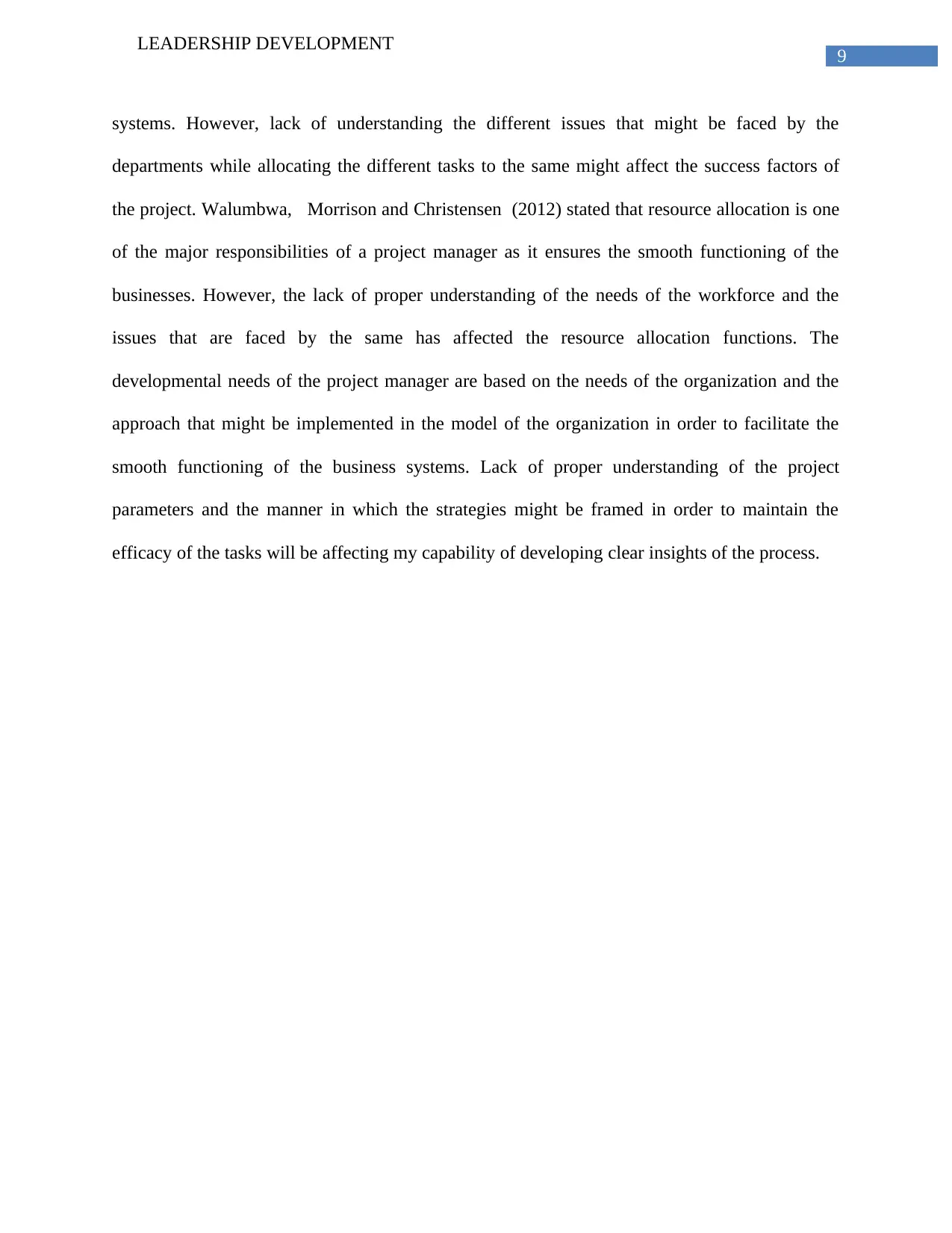
9
LEADERSHIP DEVELOPMENT
systems. However, lack of understanding the different issues that might be faced by the
departments while allocating the different tasks to the same might affect the success factors of
the project. Walumbwa, Morrison and Christensen (2012) stated that resource allocation is one
of the major responsibilities of a project manager as it ensures the smooth functioning of the
businesses. However, the lack of proper understanding of the needs of the workforce and the
issues that are faced by the same has affected the resource allocation functions. The
developmental needs of the project manager are based on the needs of the organization and the
approach that might be implemented in the model of the organization in order to facilitate the
smooth functioning of the business systems. Lack of proper understanding of the project
parameters and the manner in which the strategies might be framed in order to maintain the
efficacy of the tasks will be affecting my capability of developing clear insights of the process.
LEADERSHIP DEVELOPMENT
systems. However, lack of understanding the different issues that might be faced by the
departments while allocating the different tasks to the same might affect the success factors of
the project. Walumbwa, Morrison and Christensen (2012) stated that resource allocation is one
of the major responsibilities of a project manager as it ensures the smooth functioning of the
businesses. However, the lack of proper understanding of the needs of the workforce and the
issues that are faced by the same has affected the resource allocation functions. The
developmental needs of the project manager are based on the needs of the organization and the
approach that might be implemented in the model of the organization in order to facilitate the
smooth functioning of the business systems. Lack of proper understanding of the project
parameters and the manner in which the strategies might be framed in order to maintain the
efficacy of the tasks will be affecting my capability of developing clear insights of the process.
Paraphrase This Document
Need a fresh take? Get an instant paraphrase of this document with our AI Paraphraser
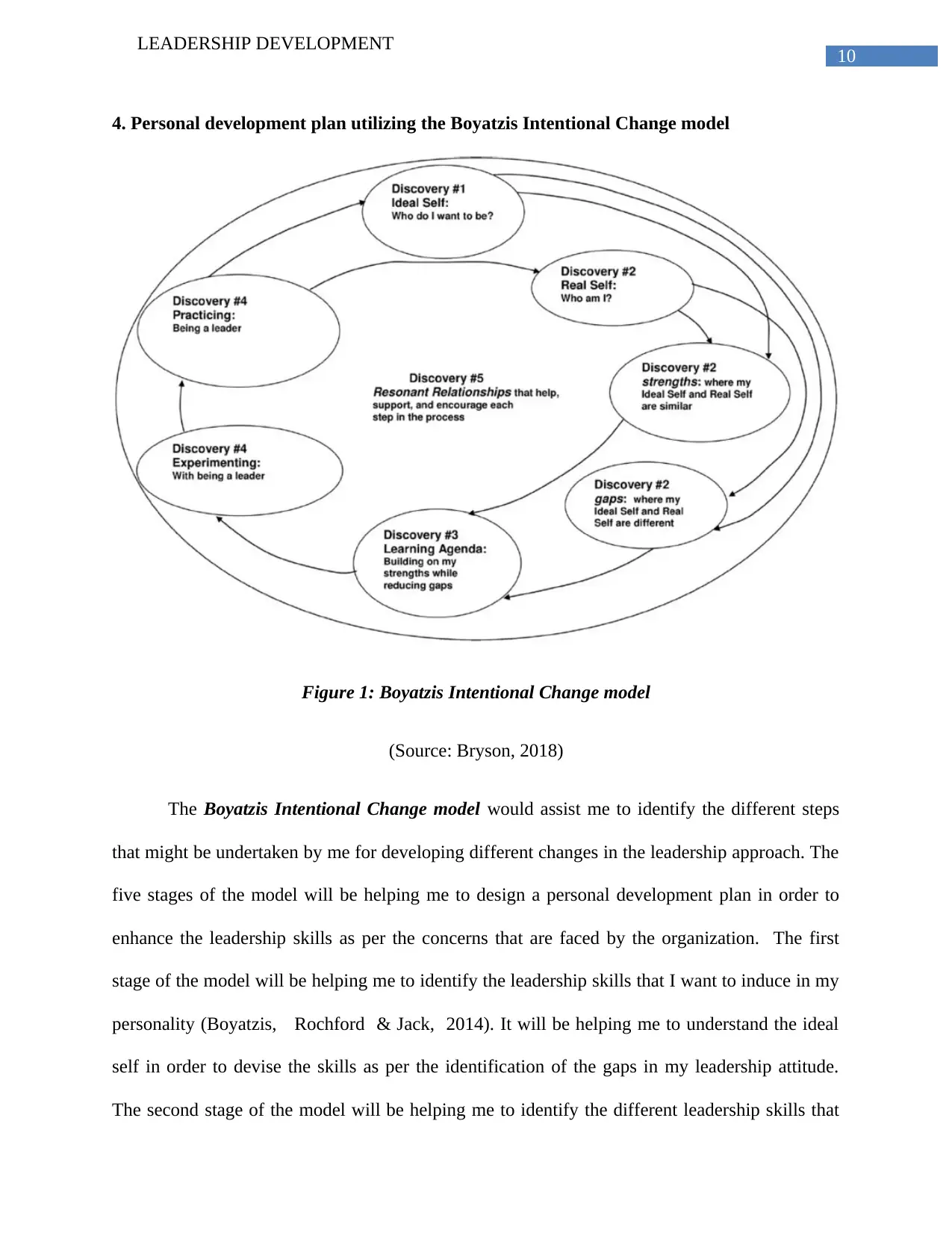
10
LEADERSHIP DEVELOPMENT
4. Personal development plan utilizing the Boyatzis Intentional Change model
Figure 1: Boyatzis Intentional Change model
(Source: Bryson, 2018)
The Boyatzis Intentional Change model would assist me to identify the different steps
that might be undertaken by me for developing different changes in the leadership approach. The
five stages of the model will be helping me to design a personal development plan in order to
enhance the leadership skills as per the concerns that are faced by the organization. The first
stage of the model will be helping me to identify the leadership skills that I want to induce in my
personality (Boyatzis, Rochford & Jack, 2014). It will be helping me to understand the ideal
self in order to devise the skills as per the identification of the gaps in my leadership attitude.
The second stage of the model will be helping me to identify the different leadership skills that
LEADERSHIP DEVELOPMENT
4. Personal development plan utilizing the Boyatzis Intentional Change model
Figure 1: Boyatzis Intentional Change model
(Source: Bryson, 2018)
The Boyatzis Intentional Change model would assist me to identify the different steps
that might be undertaken by me for developing different changes in the leadership approach. The
five stages of the model will be helping me to design a personal development plan in order to
enhance the leadership skills as per the concerns that are faced by the organization. The first
stage of the model will be helping me to identify the leadership skills that I want to induce in my
personality (Boyatzis, Rochford & Jack, 2014). It will be helping me to understand the ideal
self in order to devise the skills as per the identification of the gaps in my leadership attitude.
The second stage of the model will be helping me to identify the different leadership skills that
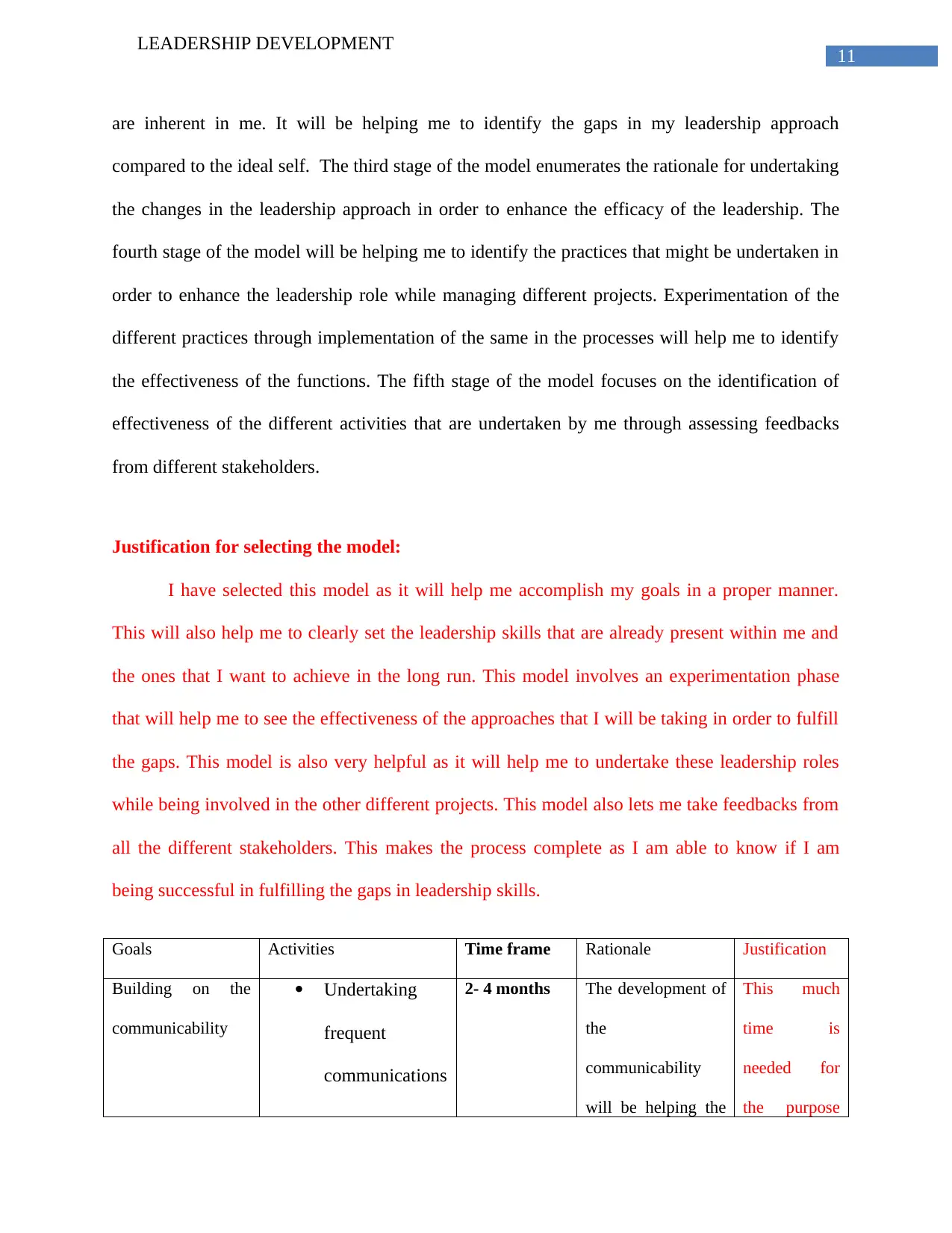
11
LEADERSHIP DEVELOPMENT
are inherent in me. It will be helping me to identify the gaps in my leadership approach
compared to the ideal self. The third stage of the model enumerates the rationale for undertaking
the changes in the leadership approach in order to enhance the efficacy of the leadership. The
fourth stage of the model will be helping me to identify the practices that might be undertaken in
order to enhance the leadership role while managing different projects. Experimentation of the
different practices through implementation of the same in the processes will help me to identify
the effectiveness of the functions. The fifth stage of the model focuses on the identification of
effectiveness of the different activities that are undertaken by me through assessing feedbacks
from different stakeholders.
Justification for selecting the model:
I have selected this model as it will help me accomplish my goals in a proper manner.
This will also help me to clearly set the leadership skills that are already present within me and
the ones that I want to achieve in the long run. This model involves an experimentation phase
that will help me to see the effectiveness of the approaches that I will be taking in order to fulfill
the gaps. This model is also very helpful as it will help me to undertake these leadership roles
while being involved in the other different projects. This model also lets me take feedbacks from
all the different stakeholders. This makes the process complete as I am able to know if I am
being successful in fulfilling the gaps in leadership skills.
Goals Activities Time frame Rationale Justification
Building on the
communicability
Undertaking
frequent
communications
2- 4 months The development of
the
communicability
will be helping the
This much
time is
needed for
the purpose
LEADERSHIP DEVELOPMENT
are inherent in me. It will be helping me to identify the gaps in my leadership approach
compared to the ideal self. The third stage of the model enumerates the rationale for undertaking
the changes in the leadership approach in order to enhance the efficacy of the leadership. The
fourth stage of the model will be helping me to identify the practices that might be undertaken in
order to enhance the leadership role while managing different projects. Experimentation of the
different practices through implementation of the same in the processes will help me to identify
the effectiveness of the functions. The fifth stage of the model focuses on the identification of
effectiveness of the different activities that are undertaken by me through assessing feedbacks
from different stakeholders.
Justification for selecting the model:
I have selected this model as it will help me accomplish my goals in a proper manner.
This will also help me to clearly set the leadership skills that are already present within me and
the ones that I want to achieve in the long run. This model involves an experimentation phase
that will help me to see the effectiveness of the approaches that I will be taking in order to fulfill
the gaps. This model is also very helpful as it will help me to undertake these leadership roles
while being involved in the other different projects. This model also lets me take feedbacks from
all the different stakeholders. This makes the process complete as I am able to know if I am
being successful in fulfilling the gaps in leadership skills.
Goals Activities Time frame Rationale Justification
Building on the
communicability
Undertaking
frequent
communications
2- 4 months The development of
the
communicability
will be helping the
This much
time is
needed for
the purpose
⊘ This is a preview!⊘
Do you want full access?
Subscribe today to unlock all pages.

Trusted by 1+ million students worldwide
1 out of 20
Related Documents
Your All-in-One AI-Powered Toolkit for Academic Success.
+13062052269
info@desklib.com
Available 24*7 on WhatsApp / Email
![[object Object]](/_next/static/media/star-bottom.7253800d.svg)
Unlock your academic potential
Copyright © 2020–2026 A2Z Services. All Rights Reserved. Developed and managed by ZUCOL.



